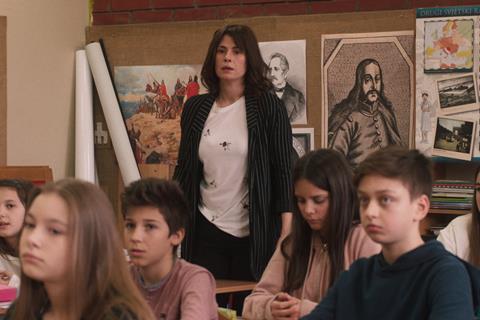
Croatian director Sonja Tarokić’s debut feature The Staffroom was the big winner at the 69th edition of the Pula Film Festival when it received nine awards at the closing ceremony at the weekend in the port’s 2,000 year-old Roman amphitheatre.
The Croatian Programme Jury, headed by Austrian director Stefan Ruzowitzky, presented the film with the festival’s main award, the Grand Golden Arena for best festival film, as well as Golden Arenas for best director, best actor for Stojan Matavulj , best supporting actress, and best editing.
In addition, Tarokić received a cash prize of €4,000 from Zagrebacka Banka, while the film’s producer Ankica Jurić Tilić of Zagreb-based Kinorama was presented with a post-production package of image and sound processing worth € 10,000 from Teleking.
The Staffroom follows a newly-arrived school counsellor Anamarija struggling to fit in and do the right thing despite the restrictions of the school system. It made its world premiere at the Karlovy Vary International Film Festival in 2021 where it received a jury special mention and a commendation from the Ecumenical jury.
International sales are being handled by New Europe Film Sales.
International acclaim
Meanwhile, Turkish director Emin Alper’s Burning Days won the Golden Arena for best film in the international programme and also the prize for best Croatian minority co-production for Anita Juka’s 4 Film. The film premiered in Un Certain Regard at Cannes earlier this year and is sold by The Match Factory.
The jury, whose members included the script consultant Christian Routh gave the Golden Arena for best Croatian contribution to a minority co-production to the actress Snjezana Sinovcić Siskov “for her warm-hearted and life enhancing portrayal” of the aunt in the Serbian film How I Learned To Fly by Radivoye Andrić, and a special mention to Ukrainian filmmaker Maksym Nakonechnyi’s Butterfly Vision, also co-produced by 4 Film.
The Critics’ Jury, who had been given the task of viewing all 21 films in the Croatian and International Programmes during the festival week, echoed the other two juries’ decisions by awarding its two prizes to The Staffroom and Burning Days.
Andrić’s How I Learned To Fly received a rapturous reception at the open-air screening in the arena and went on to win the audience awards. Even Pigs Go To Heaven by Goran Dukić won the audience award for best Croatian film.
Industry programme
For the second year, a works-in-progress showcase presented 13 projects to industry execs and programmers from events including Cannes’ Directors’ Fortnight, the Berlinale, Cluj, Tallinn, Zurich, Cottbus, and Vlissingen’s Film By The Sea.
The projects ranged from Croatian majority projects such as Goran Kulenović’s crime thriller Death of the Little Match Girl and Neven Hitrec’s family film Diary Of Pauline P. , to minority co-productions incuoding Slovenian filmmaker Igor Sterk’s Lunatic, an intimate portrait of his father Jure who was the first Slovenian to single-handedly circumnavigate the globe in his yacht, and Serbian director Kosta Dordević’s coming of age drama Sweet Sorrow.
An international jury comprised of WIFT Israel president Osnat Bukofzer, Austrian producer Oliver Neumann, and Pluto Film’s Daniela Cölle presented two awards in the form of post-production services: from Ljubljana-based Teleking for Nevio Marasović’s comedy This Is Not A Love Song - shot on location by Lake Bled - and from the Czech sound postproduction studio Sleepwalker for Jasna Nanut’s debut feature Seventh Heaven.
In addition, the jury gave the Croatian Audiovisual Centre’s (HAVC) award to Goran Dević’s documentary What’s To Be Done?
Regional collaboration
One of the roundtable discussions in the industry programme brought together the directors of the region’s film centres to explore the potential for closer collaboration. Chris Marcich of the Croatian Audiovisual Centre (HAVC), Gordan Matić of Film Center Serbia, Natasa Bucar of the Slovenian Film Center and Antonio Beus, president of the board of Sarajevo’s Foundation for Cinematography discussed plans for harmonising the funding guidelines and synchronising application guidelines.
Bucar pointed out co-production is of great importance for the small countries in the region of since financing available from each country is limited. Matić added co-production aplays a key role in helping to promote a film and raise its visibility in the market.
A working group on minority co-productions had been initiated by Film Center Serbia at the end of 2021, with the film funds of Croatia, Slovenia, Montenegro and North Macedonia in an effort to ensure projects would qualify for support from the Eurimages’ co-production fund.
Marcich noted collaborations could be possible with other countries outside of the region. A start had been made with the RE-ACT initiative set up in 2015 by HAVC with the Slovenian Film Center and Italy’s Friuli Venezia Giulia Audiovisual Fund. It has expanded in 2019 to include the Film Center Serbia as well.
The panelists reported there is now also growing interest from Italy’s Cinecittá and MIBACT as well as from Turkey to forge closer links with their film industries through collaborative ventures.
Furthermore, Matić noted, as of August 1, 2022, film professionals from North Macedonia, Albania and Serbia will able to move freely between the three countries for work as part of the Open Balkans economic initiative for cooperation in the areas of culture, tourism and the economy.

























No comments yet